Latest Archive
Free Newsletter
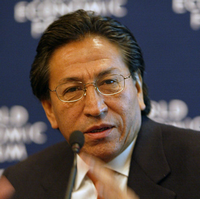
LIMA, Peru — As Peru approaches general elections on April 10, polls show that voters are leaning toward continuity, which might be expected for a country with one of the world’s fastest-growing economies. The leading contenders offer variations on the pro-business, open-market policies that have been the Peruvian status quo for two decades. The frontrunner, with 27 percent support in recent polls, is former President Alejandro Toledo, who governed from 2001-2006. A Stanford-educated economist, Toledo negotiated the country’s free-trade agreement with the United States and oversaw moderate economic growth, but endured frequent scandals and protests during his presidency. Born into […]
American policy planners for Afghanistan would do well to take note of developments in Egypt, where last week the army deployed in Cairo to fill the vacuum created by the disappearance of the hated police. To my mind, there’s a clear parallel with Afghanistan, where the notoriously corrupt police are likewise hated, while the army enjoys a similar — if not as historically established — reputation as the Egyptian military. But the difficulty in Egypt in finding an acceptable transition scenario to the current unrest suggests the limitations of a society in which the military is the only credible institution […]
Russia and Japan recently reached an agreement to build a joint liquefied natural gas plant in Vladivostok, Russia. In an e-mail interview, Michael Bradshaw, professor of human geography at the University of Leicester and vice president for Research and Higher Education at the Royal Geographical Society, discussed Russia-Japan energy cooperation. WPR: What is the status quo of Russia-Japan energy cooperation? Michael Bradshaw: Russia has only recently become a significant supplier of oil and gas to Japan. The Sakhalin-1 and Sakhalin-2 projects have progressively exported oil and liquefied natural gas (LNG) to Japan since 1999, and both have Japanese shareholders. The […]
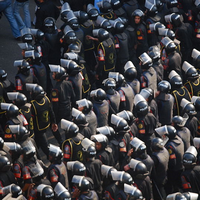
Over the weekend, Wikistrat — a Tel Aviv-based technology start-up for which I serve as chief analyst — gathered a group of Israeli and U.S. geostrategists, myself included, to take part in an online scenario-generating drill in response to the ongoing protests in Egypt. Our goal was to work up four feasible pathway trees along which events could develop — two favorable to the Egyptian people, two favorable to the Egyptian regime — and then present them online to interested parties for feedback and voting. The exercise was an attempt to harness the Web 2.0’s wisdom of the crowd for […]

The recent events in Tunisia have reverberated across the Middle East and North Africa, but they have found particular resonance in Egypt, where anger and frustration with President Hosni Mubarak’s government has escalated considerably over the past year. The violence, corruption and media censorship that accompanied last November’s parliamentary elections severely damaged the government’s credibility. Exacerbating this general frustration is the expectation that Mubarak’s son, Gamal, will succeed him and simply continue the status quo. In this week’s demonstrations, which saw Jan. 25 renamed Youm al-Ghadab, or Day of Wrath, protestors have indeed directed some of their anger at the […]
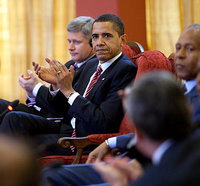
Ian Bremmer and David Gordon, of the Eurasia Group, do not sugar-coat the shape of the new world order emerging in the 21st century. They starkly note: For the first time since the end of World War II, no country or bloc of countries has the political and economic leverage to drive an international agenda. The United States will continue to be the only truly global power, but it increasingly lacks the resources and domestic political capital to act as primary provider of global public goods. There are no ready alternatives to U.S. leadership. They dub this international order “G-zero,” […]

Negotiators from the P5+1 countries and Iran failed to reach a breakthrough in Istanbul last week at thelatest round of talks over Iran’s nuclear program. Nevertheless, it seems that, once again, Iranian President Mahmoud Ahmadinejad wants to keep negotiations alive with his seemingly never-ending bazaar-style haggling. The reason is simple: Ahmadinejad’s administration requires a positive outcome, at least on paper, so that the U.S., its European allies and the United Nations Security Council lift the debilitating economic sanctions targeting the Islamic Republic. So despite last week’s stalemate, the latest of many, Ahmadinejad is dangling the carrot of compromise to lure […]
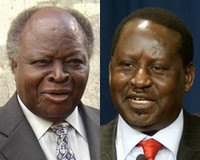
BOMET COUNTY, Kenya — Last month, when Luis Moreno-Ocampo, chief prosecutor for the International Criminal Court (ICC), requested summonses for six individuals on charges related to Kenya’s 2007-2008 post-election violence, a majority of Kenyans applauded. In a country with a deep-rooted culture of impunity, many citizens had given up on domestic justice to deal with those responsible for the violence. On the eve of Ocampo’s announcement, one poll found that 85 percent of Kenyans supported the ICC process, launched after Kenya’s government failed to establish a local tribunal for key perpetrators of the violence. Yet here in Kenya’s Rift Valley […]
With regard to Judah’s post on the current developments in the Middle East, it’s worth noting one of the arguments floating around among some in Israel — mostly security-minded hawks on the right — about the lessons from events in Egypt and elsewhere. They argue that the turmoil in the Arab world shows that it’s a mistake for Israel to trust its fate to peace treaties with despotic and ultimately unstable Arab regimes. Instead, they say, Israel should look to strategic strength, such as literal control of the high ground from where it can potentially be attacked. That includes the […]
Predicting whether the outpourings of popular disaffection sweeping the Arab world will continue to spread or result in real revolutionary change is a mug’s game. There’s been a change in tone among regional experts from, “Not a chance,” to, “Not likely, but this feels different.” But this kind of phenomenon is by its nature unpredictable, otherwise tyrants and despots would either head it off at the pass or know exactly when to pack their bags and head for the border. That said, everyone knew that in the long term, these regimes were not sustainable. What is now becoming obvious is […]
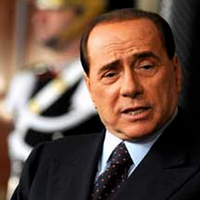
In December, Italy’s bilateral trade agreements with Russia drew media scrutiny. First, a Wikileaks cable release indicated anxiety on the part of various U.S. diplomats over Italian Prime Minister Silvio Berlusconi’s close friendship with Russia’s leaders, particularly Russian President Vladimir Putin. Then Italy’s largest energy company, Eni, renewed its extensive 2006 contract with Russia’s Gazprom, including plans to jointly build the South Stream pipeline across the Black Sea, as well as cooperation in drilling, transportation and personnel training. Critics in Italy and abroad believe the energy partnership between the two nations results as much from Berlusconi’s personal politics as from […]
The cache of documents known as the “Palestine Papers” have created much turmoil among Palestinians and subjected some of the best-known officials of the Palestinian Authority to a withering wind of criticism. The papers, 1,700 files of correspondence about the Israeli-Palestinian peace process, were reportedly leaked to the Arab-language Al Jazeera television network by unknown individuals. They have appeared in the Guardian and on Al Jazeera’s English-language Web site, where they were portrayed as evidence that Palestinian leaders betrayed their people by making huge concessions to Israel. But what the documents and the reaction to them really show is something […]
I’ve stayed away from the State of the Union address, and haven’t even read the transcript. But so far, the most interesting element from a foreign policy perspective that I’ve seen is the announcement that President Barack Barack Obama will visit Brazil, Chile and El Salvador this March. That’s great news, and I’d normally call it long overdue. But it’s worth noting that 2009-2010 might not have been the best time for an overbearing American presence in the region. The Honduran crisis, the heightened tensions between Colombia, Venezuela and Ecuador, and the fallout over the U.S. military base deal with […]
A civilian nuclear agreement between Russia and the U.S. recently entered into force. Signed in 2008, the 123 Agreement was revived by U.S. President Barack Obama as part of the U.S.-Russia reset. In an e-mail interview, Richard Weitz, senior fellow at the Hudson Institute and a World Politics Review senior editor, discussed the U.S.-Russia 123 Agreement. WPR: What was the impetus for U.S.-Russia 123 Agreement? Richard Weitz: Russian and U.S. officials wanted to improve their bilateral relationship, while their nuclear industries, two of the largest in the world, wanted to expand their commercial collaboration. Presidents George W. Bush and Vladimir […]
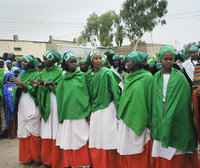
Nearly 20 years ago, Somaliland, a Florida-sized region of northeast Somalia once known as British Somaliland, declared its independence from Somalia. In the years since, Somaliland has emerged as a stable, democratic state that provides a measure of international security in a region overrun with pirates and transnational terrorists. Yet, no state or international body recognizes Somaliland’s independence. Instead, the international community is content with the fiction that Somalia remains a unified state. Denying Somaliland recognition will likely result in its eventual collapse and the expansion of the chaos, instability and international insecurity that characterizes Somalia. To prevent this eventuality, […]
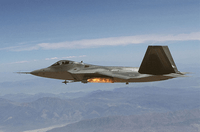
In the background of Chinese President Hu Jintao’s recent visit to the United States was the specter of increased military tensions between China and the U.S. Chinese military capabilities appear to be growing rapidly, with systems like the J-20 stealth fighter and the DF-21 anti-ship ballistic missile threatening key U.S. assets. However, the summit between Hu and President Barack Obama focused more on economic than military issues. And one of the foremost trade problems discussed during the visit was the issue of intellectual property (IP). The United States has consistently criticized China for laxness in IP regulation, complaining that Chinese […]
